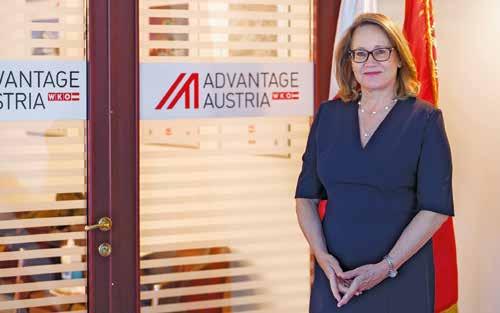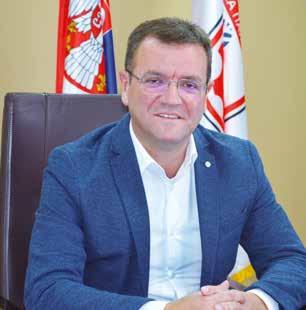
8 minute read
SUPPORTING BUSINESS, PROMOTING
Supporting Business, Promoting Growth
Advertisement
Erika Teoman-Brenner, Commercial Counsellor of the Austrian Embassy, had previously faced challenging moments in her previous postings, such as the financial crisis of 2008/2009 or terrorist bombings in her immediate surroundings. “However,” she insists, “this pandemic is nothing like anything before”. Yet, throughout all these perplexing times, the greatest strength of ADVANTAGE AUSTRIA has been its commitment to connect people and build partnerships with value. That’s also exactly what they’re doing now, by helping companies to navigate their ways through complex issues of maintaining physical contacts and spurring innovation. 24 November
After a very successful 2019, the Austrian-Serbian trade exchange fell by roughly 17% in the first six months of 2020. However, with the support of Advantage Austria, companies from both sides of the aisle are trying their best to preserve contacts and cooperation
•What kinds of trends have you noticed in the trade exchange between Austria and Serbia during 2020? What are the forecasts like as we head towards 2021? - After a very successful 2019, with bilateral trade achieving an all-time high of 1.5 billion euros, we witnessed a decline this year, due to the pandemic. Based on the latest data – covering the first six months of this year – our bilateral trade has declined by roughly 17%. Basically, all product groups have been impacted, which reflects an overall contraction of demand in Europe. Against this general trend, we witnessed an increase in Austrian deliveries of pharmaceuticals to Serbia, while during the same period Serbia exported almost twice as much frozen fruit as last year. It is practically impossible to predict developments for the next year, given the uncertainty of the evolution of the pandemic, but we certainly hope that our bilateral trade will grow again. This will not only be a function of the situation in our two countries, but more that of a global economic recovery, given the extent to which our companies are integrated into international production chains.
•How did Austrian companies that operate in Serbia cope with the altered circumstances for doing business?
- First and foremost, they ensured that their employees were as safe as possible by maintaining all necessary social distancing protocols. At the outbreak of the pandemic, the biggest challenge was probably to deal with the interruption of supply chains and the implementation of all necessary systems to support remote working. In order to get a clearer picture, though, we are awaiting the results of our upcoming annual investors’ survey. In any case, what we have witnessed so far is that our companies adapted very quickly to these extraordinary circumstances.
• What challenges are today confronting the companies that address you most often; how much have those challenges changed since the outbreak of the pandemic? - When we talk about challenges to doing business in Serbia, they have remained quite unchanged over the years. They are generally linked to administrative and regulatory issues, but also to low growth of domestic consumption and investments. Since the outbreak of the pandemic, our companies have obviously had to face a number of unexpected problems. On a practical level, travel restrictions were probably the most challenging, given the geographical proximity and close business relations between companies in Austria and Serbia, and - last but not least - the large number of Serbian citizens commuting between the two countries. It is fair to say that our office has become a very important – and appreciated, if I may add – point of reference for Austrian and Serbian companies seeking up-to-date information on travel regulations. • What has represented the positive side of the COVID-19 crisis when it comes to innovation? How active have Austrian companies been in this field? - We probably all agree that COVID-19 has impacted nearly every aspect of life, from

Austrian companies took every action to protect not only the health of their employees, but also to preserve their workplaces, and by doing so they contributed greatly to maintaining employment in these difficult times.
the way people live and work, to the ways companies operate and interact with their customers. As a response to this, a number of innovative products and services have entered the market. Looking at Austrian companies, there have been some interesting innovations, such as a contact tracing app for the hospitality industry or a DIY Corona test kit sold through drug stores. Another start-up offers free Youtube workshops for maintaining mental health during times of crisis.
• At the same time, you are also involved actively in fostering innovation as a way of supporting sustainable development in the region of the Western Balkans. Can you tell us more about the outcomes of these initiatives? - We are indeed involved in a joint initiative of the Austrian Development Agency and the Austrian Research Promotion Agency
that aims at supporting the establishment of cross-border partnerships between Austria and the Western Balkans that contribute to the Sustainable Development Goals through so-called frugal innovation, a concept that is quite new in this region. We are still in the initial phase, but the talks we’ve had so far with potential partners have proved promising.
•How have Austrian companies contributed to Serbia combatting the consequences of the pandemic? - Immediately after the outbreak of the pandemic, a number of Austrian companies in Serbia donated protective equipment and ventilators to various Serbian organisations. But what is probably more important is that they continue to be totally committed to their operations in Serbia, and to their employees in particular. They take every action to protect not only their health, but also their workplaces, and by doing so they contribute greatly to maintaining employment in these difficult times. ■

Life Is Returning To Bela Palanka
Bela Palanka is a place that ensures an increasingly better quality life for citizens through the creation of a favourable business climate and the construction of infrastructure. This municipality's Sustainable Development Strategy defines industry, agriculture and tourism as its pillars of economic development
TGRS is a company that will employ 100 workers in Bela Palanka in the first phase of its investment cycle, then in the second phase – in January 2022 – it will launch production activities at a new factory in the “Murica 1” industrial zone. According to Bela Palanka’s municipal leader, another 250 citizens will be employed at this factory.
• You have seriously committed yourself to enticing investors and leading the economic recovery of Bela Palanka. Have better days finally arrived for your municipality? - Using all available resources, as well as our good strategic position – given that Corridor 10 passes 26 November
through the municipality, as well as a first class state road covering a distance of 32 kilometres – we strive to achieve economic progress.
In terms of industrial development, today we have the Murica 1 and Murica 2 industrial zones, encompassing a total area of 13 hectares in close proximity to Corridor 10, as well as two brownfield locations where companies Trendtex and TGRS operate. There are large investments on the territory of the municipality in the area of renewable energy sources, so we have two mini-hydro power plants installed on the River Nišava, while preparations for the construction of three more are underway. We help entrepreneurs directly by allocating funds • After the arrival of Trendtex, you secured another investor in the form of Austrian company TGM Services, which will produce vehicle steering wheels in Bela Palanka. Tell us more about this... - In creating conditions for the arrival of new investors, we repurchased the plant of the former Femid factory a few years ago. We completed the reconstruction of the facility, investing a total of around a million euros, and leased it to a new investor, TGRS, for the opening of an auto parts factory. The Municipality of Bela Palanka signed a Memorandum of Understanding with the new investor, according to which 100 workers will be employed in the first phase of the investment
for the implementation of self-employment and new employment programmes.
We have made great progress in agriculture thanks to land consolidation. We have already attracted investors, so today we have about 50 hectares of cherry orchards, quince trees covering 10 ha, 1000 ha of immortelle plants, 30 ha of lavender and other medicinal herbs covering an area of 32 ha. We are the first municipality in Serbia to start granting subsidies to young people wanting to engage in agriculture and remain in rural areas.
Our commitment to the goal of tourism becoming a driver of economic development is shown by the results of the 2019 Banica Days event, which was visited by more than 40,000 tourists. Thanks to the large number of visitors, our priority will be to construct accommodation capacities that are lacking. We will continue investing in tourism infrastructure and will work on the development of rural tourism. cycle. In the second phase, to be implemented by the end of 2021, company TGRS will build a factory in the Murica 1 industrial zone, where production will start in January 2022 and 250 people from Bela Palanka will be employed.
• Bela Palanka is part of the IRE network, which currently encompasses more than 120 regions, cities and municipalities... How important is that for small and underdeveloped municipalities like yours? - The Municipality of Bela Palanka has been a member of the Institute of European Regions since 2014, which provides us with logistical support, enables us to be present at conferences to exchange experiences and promotes education through examples of good practice. We are networked with municipalities from European countries via the IRE to ensure the successful application of all European standards, which is of great importance given that our country is in the process of integrating into the EU. ■










